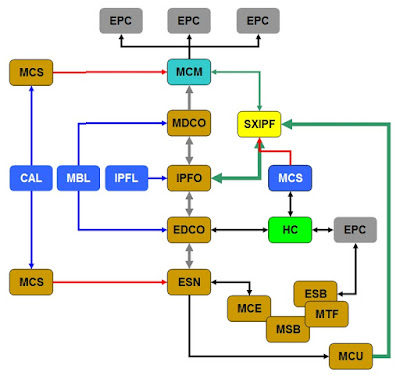5.0 Solutions
Humans are creatures of Earth, and for the most part we roam in open spaces and enjoy the rewards of our labors. We harvest our food from land, sea and air and build great cities to house our families and provide places to work. We have rule of law and a means of dispensing and receiving justice.
This basic layout addresses the three aspects of colonial society. To the left is law and governance, the center represents business, and to the right are the technology, finance and development parts of the plan. This list of the acronyms will help you to better understand the model while full explanations of each are contained in other posts.
CAL Colonial Administrative Law (Colony based Planetary law)
DCO Director of Colonial Operations (planetary based)
EDCO Earth Director of Colonial Operations (Earth Based)
EPC Earth Planetary Companies (Earth companies doing business in or for the colonies)
ESG Earth Side Building (1 of three aspects of the training and testing facility)
ESN Earth Sovereign Nation (Colonial representation on Earth - as a country or embassy)
HC Holdeck Consortium (Financial investors supporting Earth planet side functions)
IPFL Interplanetary Flight Law ( Governs in flight transit to colonies)
IPFO Interplanetary Flight Operations ( Flight control operations - space port operations)
MBL Mars Business Law - (Defines standards for business operations and contracts etc)
MCE Mars Colony Earth - (Earth based colonial operations from training to embassy functions)
MCM Mars Colony Mars - (The off-world colony - in this case, Mars)
MCS Mars Colonial Security - (Colonial administrative functions incl. all forms of security)
MCU Mars Colonial University - (Earth based training facility)
MSB Mars Side Building - (1 of three aspects of the training and testing facility)
MTF Mars Test Facility - (1 of three aspects of the training and testing facility)
SXIPF Interplanetary Flights - (The transportation platforms and companies to reach other planets)
This plan utilizes a combination of government, business and military administrative models working as one to develop a workable administrative forum with none having more authority than another.
The image above represents the business and colonial model of what I believe is necessary to successfully develop interplanetary colonial operations. The explanation of its component parts is described starting in 6.0

Comments
Post a Comment